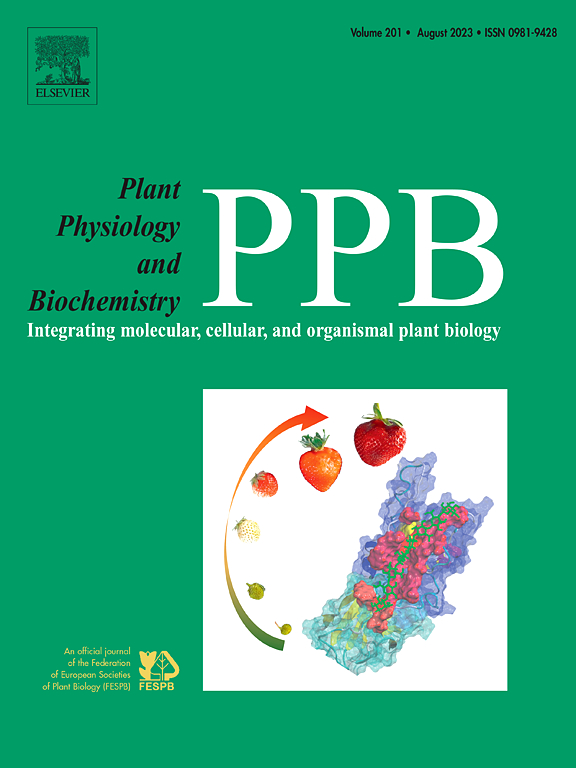Foliar exposure to microplastics disrupts lettuce metabolism and negatively interferes with symbiotic microbial communities
IF 6.1
2区 生物学
Q1 PLANT SCIENCES
引用次数: 0
Abstract
Plant leaves are considered an important sink for atmospheric microplastics (MPs) because they serve as a vital interface between the atmosphere and terrestrial ecosystems. However, there is still a dearth of information regarding how plant-symbiotic microbe-soil systems are affected by foliar exposure to MPs. In this study, MPs (polystyrene (PS), polyethylene (PE), and polypropylene (PP)) were sprayed over soil-cultivated lettuce (Lactuca sativa L.) four occasions, with final sprays containing 0.4 and 4 μg of MPs per plant. MPs had no discernible impact on lettuce growth as compared to the control group. However, MPs led to reductions in relative chlorophyll content from 16.91 to 30.64 % and net photosynthetic rate from 6.64 to 81.41 %. These results validate the phytotoxicity linked to MP exposure through foliar application. The presence of MPs triggered interspecific competition among phyllosphere microbial species and reduced microbial network complexity by forming ecological niches and regulating carbon- and nitrogen-related metabolic pathways. Furthermore, MPs inhibited the growth of beneficial bacteria in the rhizosphere soil, including a variety of plant growth-promoting bacteria (PGPR) such as Rhizobiales, Pseudomonadales, and Bacillales. This study identifies the ecological health risks associated with atmospheric MPs, which may have a detrimental impact on crop production and further compromise soil ecosystem security.

叶面接触微塑料会破坏生菜的新陈代谢,并对共生微生物群落产生负面干扰
本文章由计算机程序翻译,如有差异,请以英文原文为准。
求助全文
约1分钟内获得全文
求助全文
来源期刊
CiteScore
11.10
自引率
3.10%
发文量
410
审稿时长
33 days
期刊介绍:
Plant Physiology and Biochemistry publishes original theoretical, experimental and technical contributions in the various fields of plant physiology (biochemistry, physiology, structure, genetics, plant-microbe interactions, etc.) at diverse levels of integration (molecular, subcellular, cellular, organ, whole plant, environmental). Opinions expressed in the journal are the sole responsibility of the authors and publication does not imply the editors'' agreement.
Manuscripts describing molecular-genetic and/or gene expression data that are not integrated with biochemical analysis and/or actual measurements of plant physiological processes are not suitable for PPB. Also "Omics" studies (transcriptomics, proteomics, metabolomics, etc.) reporting descriptive analysis without an element of functional validation assays, will not be considered. Similarly, applied agronomic or phytochemical studies that generate no new, fundamental insights in plant physiological and/or biochemical processes are not suitable for publication in PPB.
Plant Physiology and Biochemistry publishes several types of articles: Reviews, Papers and Short Papers. Articles for Reviews are either invited by the editor or proposed by the authors for the editor''s prior agreement. Reviews should not exceed 40 typewritten pages and Short Papers no more than approximately 8 typewritten pages. The fundamental character of Plant Physiology and Biochemistry remains that of a journal for original results.

 求助内容:
求助内容: 应助结果提醒方式:
应助结果提醒方式:


